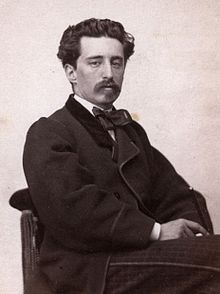Eduardo de la Barra
Eduardo de la Barra | |
|---|---|
 | |
| Born | Eduardo de la Barra Lastarria 9 February 1839 Santiago, Chile |
| Died | 9 April 1900 (aged 61) Valparaíso, Chile |
| Occupation | Writer, diplomat, geographer, philosopher |
| Language | Spanish |
| Nationality | Chilean |
| Notable works |
|
Eduardo de la Barra (1839–1900) was a Chilean writer, diplomat and geographer. De la Barra is known for his polemics, including his opposition to what he perceived as an excessive German cultural and scientific influence in Chile. For this purpose he coined the concept of a "the German bewichment" (Spanish: el embrujamiento alemán). This earned him criticism as being himself a promoter of Latin culture ("romanizer").[1]
References[edit]
- ^ Sanhueza, Carlos (2011). "El debate sobre "el embrujamiento alemán" y el papel de la ciencia alemana hacia fines del siglo XIX en Chile" (PDF). Ideas viajeras y sus objetos. El intercambio científico entre Alemania y América austral. Madrid–Frankfurt am Main: Iberoamericana–Vervuert (in Spanish). pp. 29–40.
